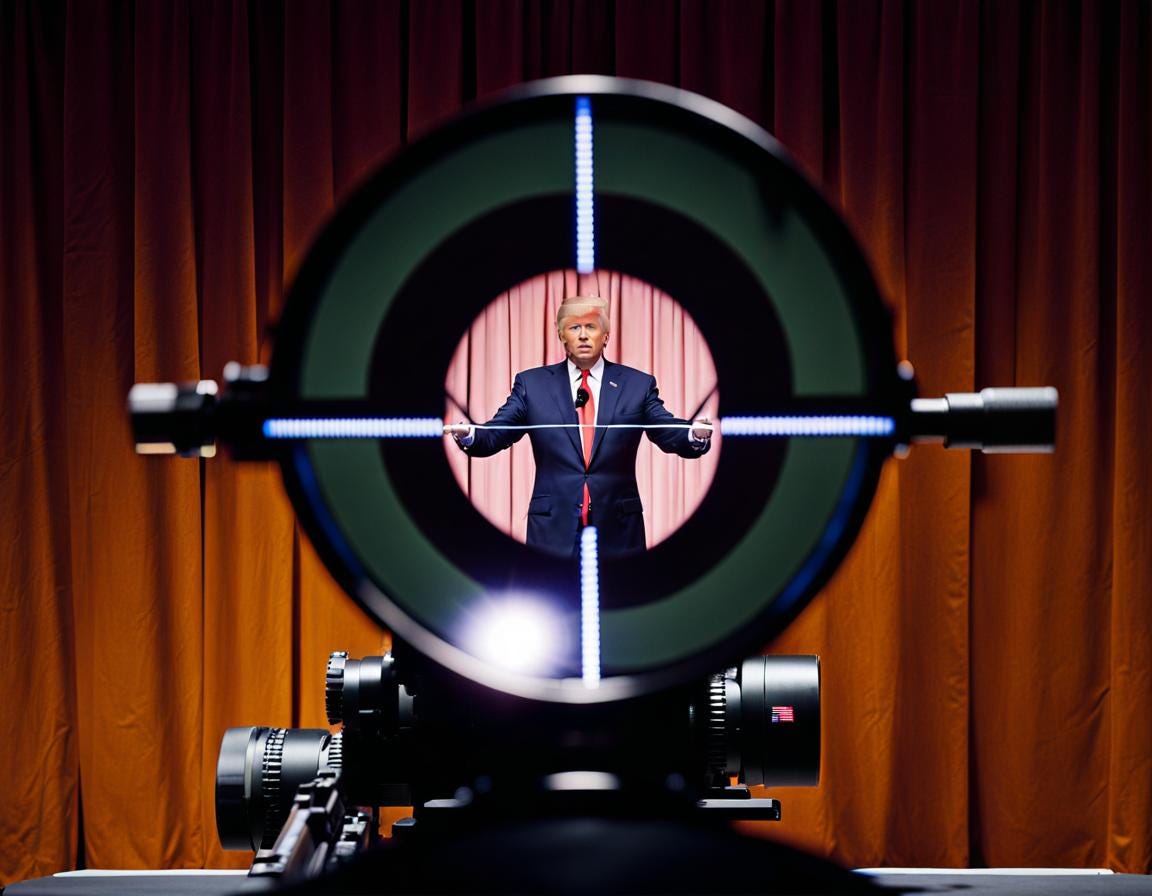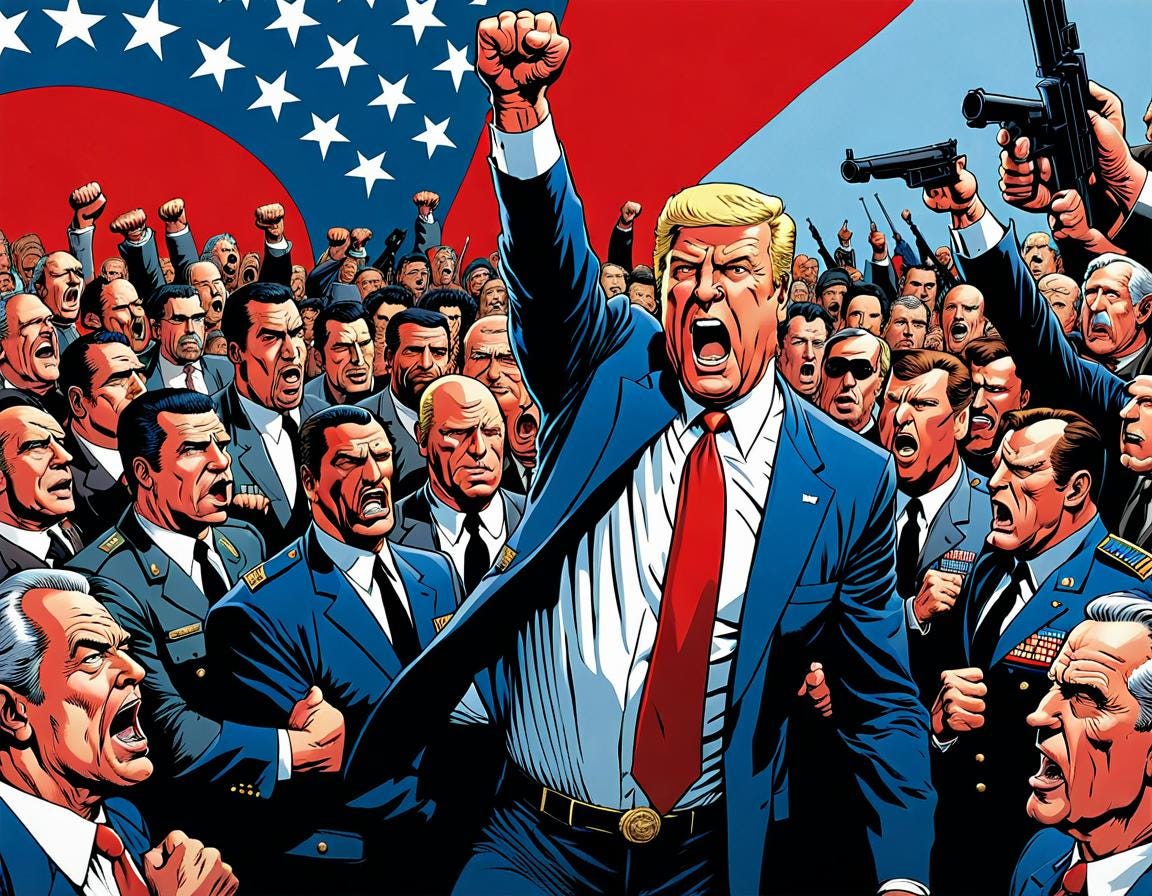I’d hazard to guess you’ve heard how, on 13 July 2024, former U.S. President and Republican presumptive nominee Donald Trump was shot in the upper right ear at a campaign rally in Butler, PA, in an attempted assassination that killed one attendee and critically injured two others. Trump was promptly surrounded and assisted by Secret Service agents, then transported to a hospital where he was treated and released in stable condition. The assailant, Thomas Matthew Crooks, fired eight rounds from a nearby building before being killed by a Secret Service sniper.

This incident marked the first time a former or sitting U.S. president was injured in an assassination attempt since 1981, and has heightened concerns about political polarization in the U.S., with calls on social media to increase security for major candidates and expressions of sympathy for Trump. Security was indeed strengthened at Trump Tower and at the Republican National Convention that began on Monday in Milwaukee, WI. Following the incident, Trump’s campaign organized a fundraising campaign for the victims, raising over $2 million.
As one would expect, various conspiracy theories about the event proliferated in the aftermath, appearing across the political spectrum: The Washington Post and BBC News reported how many left-wing social media accounts falsely suggested that the shooting was staged—including notable figures like LinkedIn co-founder Reid Hoffman—while NBC News reported that “conspiracy theorists” such as Alex Jones suggested, in posts and videos that have received millions of views, that the assassination attempt represented a deep state plot.
(In addition, Georgian prime minister Irakli Kobakhidze blamed what he calls “the Global War Party”: a secretive international entity that exerts significant influence on the U.S. and the EU, and which allegedly manipulates global affairs to prolong conflicts, assassinate leaders, orchestrate revolutions, and undermine national sovereignty, posing a significant threat that necessitates a strenuous defensive effort.)
Of course, the aforementioned BBC News could surely be named as a source for similar claims, having aired a live interview with a rally attendee immediately after the shooting. The witness described how he and others were standing outside the event venue near a greenhouse when they noticed a person crawling on the roof of a nearby building with a rifle. They alerted the police and Secret Service, but the person remained on the roof for several minutes before the Secret Service shot and killed him. The witness also expressed his surprise that the Secret Service was not more vigilant in securing the surrounding buildings, given the potential security risks, and questioned why the Secret Service was not stationed in every building in the area, given the relatively small size of the venue.
That interview became one focus (at ~1:34) of the event’s coverage on The Jimmy Dore Show the next day. That same episode also featured (at ~0:14) the analysis of Candace Owens, a conservative commentator who expressed her disbelief that the Secret Service could have missed the gunman approaching Trump—given their extensive security protocols and her personal experiences with their vigilance—recounting an incident where her husband was nearly shot by Secret Service agents for approaching unexpectedly. After citing (at ~6:11) an Associated Press release describing how rally attendees noticed a man climbing onto a nearby rooftop and alerted law enforcement to no avail, Dore naturally questions whether the official narrative provided by news outlets and authorities is accurate, or if there has been a cover-up of intentional involvement by possible third-parties.
Of course, he wasn’t the only one: Brian Berletic of The New Atlas aired his own analysis the same day, with all the useful insights that a former U.S. Marine officer could offer.
Berletic highlights (at ~1:33) several security lapses by the U.S. Secret Service during the event, such as the presence of a large American flag that could aid a potential assassin in determining wind speed and direction, and the lack of security measures to prevent access to potential sniper positions identified by Secret Service snipers, and expresses a disbelief similar to Owens’ at the level of incompetence displayed by the Secret Service, especially given the presence of an actual would-be assassin. Accordingly he speculates (at ~5:43) that the security lapses could have been intentional, drawing parallels to past incidents where the FBI allegedly facilitated or orchestrated terrorist plots: for example, the 1993 World Trade Center bombing and the Christmas tree bomber in Portland, Oregon, where the FBI allegedly trained and provided weapons to individuals before foiling their own operations.
Questioning (at ~12:50) the motivations behind the assassination attempt, Berletic also suggests that it may be a ploy to divert public attention from more pressing issues such as corporate misconduct, healthcare concerns, and the threat of war, noting that neither Trump nor Biden significantly changed the trajectory of U.S. foreign or domestic policy during their respective terms—since, after all, the real power lies with corporations that the public supports through their consumer choices.
Certainly the attempted assassination of a former president and current candidate would provide a considerable diversion. Others, however, seem to interpret the attempt less as an effort to conceal the threat of war, and more as an effort to realize it: that same Sunday, Arktos Journal published an article from Alexander Dugin—whom we featured prominently last month in our mid-year dispatch—arguing that the assassination attempt on Trump transpired with deep state support, and marks an escalation in the globalists’ efforts to retain power against a shift towards a multipolar world order.
(This came on the heels of Dugin’s 21 June staging of the 2024 U.S. presidential election as critical for the future of humanity, predicting either a Trump victory or catastrophic consequences—continued global conflicts and potentially a nuclear war while those globalists aiming to create a liberal technocratic world order—whereas Trump’s preference for national sovereignty over globalism would bolster a multipolar world order, challenging the dominance of globalist elites. Here, Dugin warns that globalists might employ extreme measures, including assassination or inciting a civil war, to prevent Trump from winning, ultimately leading him to frame the outcome of November’s elections as determining the survival of humanity.)
Asserting that the globalists aim to eliminate Trump as a significant threat to their dominance—especially since he is likely to win the upcoming election—Dugin draws parallels between this incident and other alleged globalist-led assassination attempts against anti-globalist leaders, like Russian President Vladimir Putin and Slovakian Prime Minister Robert Fico. He claims that the globalists—represented by figures such as Obama, Blinken, Hillary Clinton, and Biden—are willing to suspend democracy and resort to violence to maintain control. The assassination attempt, according to Dugin, reveals the true face of globalism, which seeks absolute planetary power at the expense of sovereign nations. He calls for resistance against this agenda, warning that failing to act will lead to further destruction by what he describes as a criminal gang of liberals and globalists: Kobakhidze’s “Global War Party,” I suppose.
The following day, Rainer Shea offered a contrasting analysis with a domestic focus, as opposed to an international one. As Shea sees it, indications point to factions within the ruling class—potentially including elements of the deep state—as bearing responsibility for the assassination attempt, suggesting that the Republican Party’s neoconservative wing may have wanted to eliminate Trump to install Nikki Haley as the nominee during this week’s elections. But regardless of who orchestrated the attack, Shea sees significant implications for intra-ruling-class conflict: while the predominant faction of the ruling class sought to downplay the event, it sparked widespread discourse, putting many Americans in opposition to the deep state. Accordingly, Shea argues that communists need to find revolution-compatible elements among those rejecting liberal narratives to unite with them against U.S. imperialism, leveraging the ruling-class fissures that resulted in last weekend’s assassination attempt to expand the anti-monopoly united front throughout the American masses.

Maybe people aren’t too far off the mark in suggesting that the assassination attempt had support from the deep state: after all, the alleged negligence of the Secret Service may represent an escalation of the prior trend of prejudicial treatment toward political opponents explored in last month’s bulletin on Trump’s recent conviction.
Since that conviction, moreover, the U.S. Supreme Court formalized presidential immunity from criminal prosecution for official acts undertaken during the presidency within the president’s exclusive constitutional authority. Now, after the assassination attempt, a federal judge has dismissed charges against Trump for mishandling classified documents, ruling that the U.S. Attorney General acted outside his authority in appointing Special Counsel. So, if indeed a conspiracy to assassinate Trump—whether due to the willful neglect of the Secret Service or to the activation of a mind-controlled assassin from the latest generation of MKUltra subjects—was simply unsuccessful, maybe the globalists or the predominant faction of the American ruling class (or both) finally realized that weaponizing the U.S. legal system just couldn’t take them as far as they needed to go.
If the agents or police present allowed an attempted assassination on the candidate, that would set a dangerous precedent that not only threatens individual lives but which also—given the political polarization discussed above—risks deepening societal divisions, potentially leading to greater unrest and loss of faith in democratic institutions. Indeed, last weekend’s assassination attempt may even foreshadow further civil discord in the U.S. to fulfill our start-of-year forecast. This latest violent act against a prominent political figure could serve as a catalyst for escalating tensions, reminiscent of the predictions from commentators James Corbett and James Evan Pilato. Going forward, Americans would do well to watch for militant conservative reactions—or, indeed, radical liberal ones, if this does propel Trump to victory in November—from potential agent provocateurs, along with a broader eruption of domestic conflict.
Unless, of course, the imperialist ruling class has some better assassins. (But if it’s already come to this, why would you save the best for last?)




